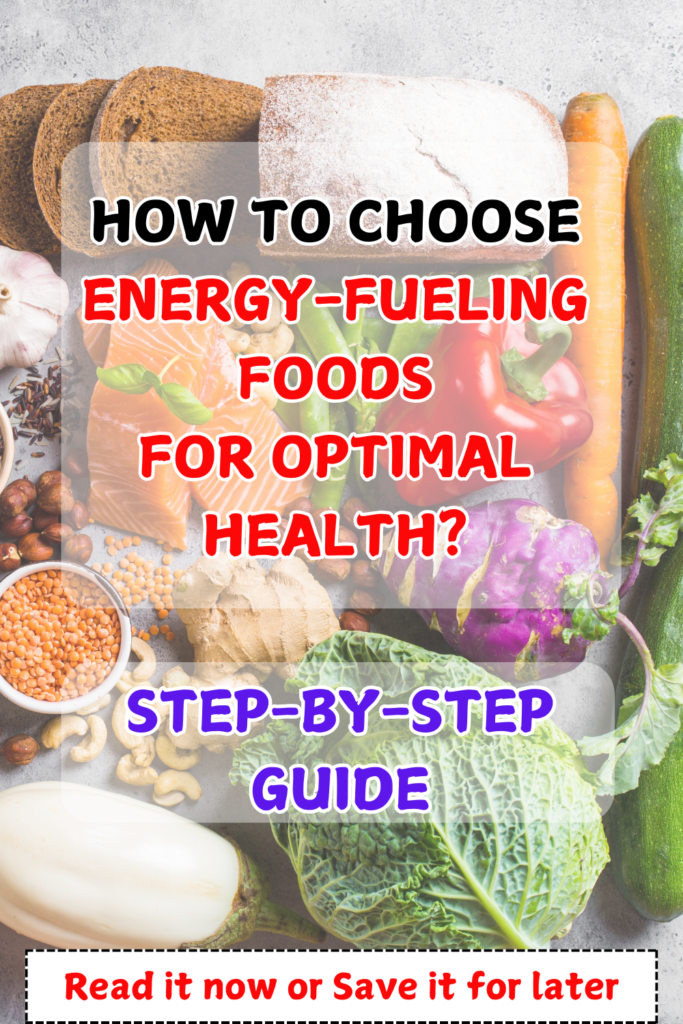In our fast-paced world, staying energized and healthy is more important than ever.
From morning meetings to late-night workouts, the foods we eat play a huge role in maintaining our energy levels.
But what exactly are energy-fueling foods, and how can you choose the right ones to fuel your body for optimal health?
This article will guide you through the process of choosing the best Energy Fueling foods for optimal health to fuel your body, understand how they work together, and help you make choices that lead to sustained energy throughout the day.
Understanding Energy Sources
To properly fuel your body, it’s essential to understand where your energy comes from.
Your food is broken down into macronutrients (carbohydrates, proteins, and fats) and micronutrients (vitamins and minerals).
These nutrients provide the building blocks your body needs to generate energy.
What are Macronutrients?
Macronutrients are the nutrients your body needs in large amounts.
They include carbohydrates, proteins, and fats, each serving a specific role in keeping you energized.

- Carbohydrates provide immediate energy.
- Proteins repair muscles and build tissues.
- Fats offer long-term energy storage and support cellular function.
The Role of Micronutrients in Energy
Vitamins and minerals, though needed in smaller amounts, are just as important for sustaining energy.
They support processes that allow your body to convert food into usable energy.

For instance, magnesium plays a key role in muscle function, while vitamin B12 is essential for the production of red blood cells, which carry oxygen throughout the body.
Carbohydrates: The Body’s Primary Fuel
When you think of energy, carbs are likely the first thing that comes to mind.
Carbs are the body’s preferred source of energy, and they’re converted into glucose, which your cells use as fuel.
Simple vs. Complex Carbs
Not all carbs are created equal. Simple carbs, found in sugary snacks and drinks, are quickly digested, leading to rapid spikes and crashes in energy.
On the other hand, complex carbs—found in whole grains, fruits, and vegetables—provide more sustained energy, as they take longer to digest and release glucose slowly.
Best Sources of Carbs for Sustained Energy
To keep your energy levels stable, focus on complex carbs. Some great options include:
- Whole grains like brown rice, quinoa, and oats
- Legumes such as lentils and beans
- Starchy vegetables like sweet potatoes and squash
- Fruits like apples, berries, and bananas

Proteins: Fuel for Muscle and Repair
While carbs provide quick energy, protein is essential for muscle repair and growth, which can indirectly affect your energy levels, especially after physical activity.
The Relationship Between Protein and Energy
Protein doesn’t give your body an immediate energy boost like carbs, but it helps sustain your energy by maintaining muscle mass and preventing fatigue.
It’s essential for recovery after exercise and can help maintain a steady supply of energy during prolonged activities.
Top Protein-Rich Foods for Energy
Some great protein-packed foods to keep you energized include:
- Chicken, turkey, and lean meats
- Fish, especially fatty types like salmon
- Eggs
- Greek yogurt
- Tofu and tempeh for plant-based protein
- Nuts and seeds like almonds and chia seeds

Healthy Fats: Fuel for Long-Term Energy
Fats often get a bad reputation, but they are an essential part of a healthy diet.
They provide a slow and steady source of energy and are crucial for brain function and overall health.
Why Fats are Essential for Energy
Fats are converted into fatty acids, which your body uses for energy, particularly during periods of rest or lower intensity activity.
They also help absorb fat-soluble vitamins like vitamins A, D, E, and K.
Different Types of Fats and Their Benefits
Not all fats are created equal, though. Focus on these healthy fats:
- Avocados
- Olive oil
- Nuts like almonds, walnuts, and cashews
- Fatty fish like salmon and mackerel
- Seeds such as flaxseeds and chia seeds

Vitamins and Minerals: Boosting Your Energy Levels
Vitamins and minerals are essential in converting food into usable energy and supporting overall health.
For example, B vitamins are crucial for converting carbs into glucose, and minerals like iron help transport oxygen to your cells, allowing them to function properly.
Key Minerals That Support Energy Levels
- Iron: Helps prevent fatigue by supporting red blood cell function.
- Magnesium: Relieves muscle cramps and supports energy production.
- Potassium: Regulates fluid balance and nerve function.
Hydration: Water’s Role in Energy Production
Your body is made up of around 60% water, and staying hydrated is critical for maintaining energy levels.
Dehydration can cause fatigue, headaches, and concentration problems, so it’s important to stay hydrated throughout the day.

How Dehydration Affects Energy
Even mild dehydration can lead to tiredness, lack of focus, and decreased physical performance.
Water helps transport nutrients, regulate body temperature, and remove waste products, all of which are necessary for maintaining your energy levels.
The Best Hydrating Drinks for Energy
- Water (always the best choice)
- Herbal teas like mint or chamomile
- Coconut water (a great source of electrolytes)
- Fresh fruit juices (without added sugar)
Meal Timing: When to Eat for Maximum Energy
What you eat is important, but when you eat is just as crucial. Skipping meals or eating too much at once can lead to energy dips.
To keep your energy levels stable, it’s best to have balanced meals throughout the day.
The Importance of Balanced Meals
Aim to combine carbs, protein, and fats in each meal to provide steady energy.
If you’re feeling sluggish, it could be because you’re not eating the right balance of nutrients.

Best Times to Eat for Sustained Energy Throughout the Day
- Breakfast within an hour of waking up
- Lunch around 4-5 hours after breakfast
- A light dinner with an emphasis on protein and veggies
- Healthy snacks between meals if needed
Avoiding Energy Drains: Foods to Limit
Not all foods are created equal when it comes to maintaining energy. Some can cause energy crashes that leave you feeling drained and sluggish.
Foods that Cause Energy Crashes
- Sugary snacks and sodas can lead to a quick energy spike, followed by a crash.
- Refined carbs like white bread and pasta can lead to blood sugar imbalances, resulting in fatigue.
Why Sugar and Refined Carbs Should Be Avoided
These foods cause rapid spikes and crashes in blood sugar, which can drain your energy levels and cause irritability.
Opt for whole foods and natural sugars from fruits instead.

Snacking Smart: Fuel Between Meals
Between meals, it’s important to choose snacks that keep you energized without sabotaging your health.
Healthy snacks can provide a quick energy boost and prevent overeating at mealtime.
Healthy Snack Options for Quick Energy
- A handful of nuts and seeds
- Greek yogurt with berries
- Hummus with veggies
- Hard-boiled eggs
- Whole-grain crackers with avocado

How to Balance Your Snack for Sustained Fuel
- Aim for snacks that include a mix of carbs, protein, and healthy fats.
- This combination helps provide steady energy and keeps hunger at bay.
The Role of Fiber in Maintaining Energy
Fiber is crucial for regulating your digestion and maintaining energy levels. It helps slow down the absorption of sugar, preventing energy crashes.
How Fiber Helps Regulate Energy Levels
Fiber-rich foods are digested more slowly, releasing glucose at a steady pace. This helps maintain energy levels and keeps you feeling full longer.
High-Fiber Foods for Long-Lasting Energy
- Whole grains like oats, quinoa, and barley
- Beans and lentils
- Fruits like apples, pears, and berries
- Vegetables like broccoli and carrots

Eating for Energy: Sample Meal Plan
Here’s a simple, energy-boosting meal plan to get you started:
- Breakfast: Oatmeal topped with chia seeds, berries, and almond butter
- Lunch: Grilled chicken salad with mixed greens, avocado, and quinoa
- Snack: A handful of mixed nuts
- Dinner: Baked salmon with sweet potatoes and steamed broccoli

The Impact of Lifestyle on Energy Levels
- Good nutrition is just one part of the equation.
- Your overall lifestyle—especially sleep, exercise, and stress management—also plays a major role in how energized you feel.
How Sleep, Exercise, and Stress Affect Energy
- Sleep: Poor sleep can drain your energy and impair your body’s ability to use nutrients effectively.
- Exercise: Regular physical activity boosts energy levels and improves circulation.
- Stress: Chronic stress can deplete your energy and disrupt sleep patterns.

The Synergy Between Diet and Lifestyle for Optimal Health
- To truly fuel your body for optimal health, focus on a holistic approach.
- Combine a nutrient-rich diet with regular exercise, proper sleep, and stress management techniques.
Common Myths About Energy-Fueling Foods
There are plenty of misconceptions about energy foods. Let’s break down a few.
Debunking Energy Food Myths
- Myth: Caffeine is the best energy booster.
Fact: While caffeine provides a short-term boost, it can lead to energy crashes later. Focus on balanced meals for sustained energy. - Myth: Carbs should be avoided for energy.
Fact: Carbs are essential for energy, especially whole grains and vegetables. Avoid refined carbs but embrace complex ones.
Conclusion: Make Energy-Fueling Foods a Part of Your Life
- Eating for energy isn’t about following strict diets or cutting out entire food groups.
- It’s about making smart, balanced food choices that support your body’s natural energy production.
- By focusing on whole foods, healthy fats, and complex carbs, you’ll set yourself up for success—both in the short term and long term.
- Fuel your body the right way, and you’ll experience better focus, improved mood, and more sustainable energy to power through your day!
FAQs
- What is the best breakfast to fuel energy?
- A balanced breakfast with whole grains, protein, and healthy fats is ideal. Try oatmeal with chia seeds and almond butter.
- How much protein should I consume for sustained energy?
- Aim for about 20-30 grams of protein per meal to support energy levels and muscle repair.
- Are there any quick energy-boosting foods I can snack on during work?
- Yes! Opt for snacks like mixed nuts, Greek yogurt with berries, or whole-grain crackers with hummus.
- How does sugar impact my energy levels throughout the day?
- Sugar causes quick energy spikes, followed by crashes. It’s best to avoid sugary snacks and drinks to maintain steady energy.
- Can I boost my energy without caffeine?
- Absolutely! Focus on nutrient-dense meals, stay hydrated, and get regular exercise to naturally boost your energy levels.


